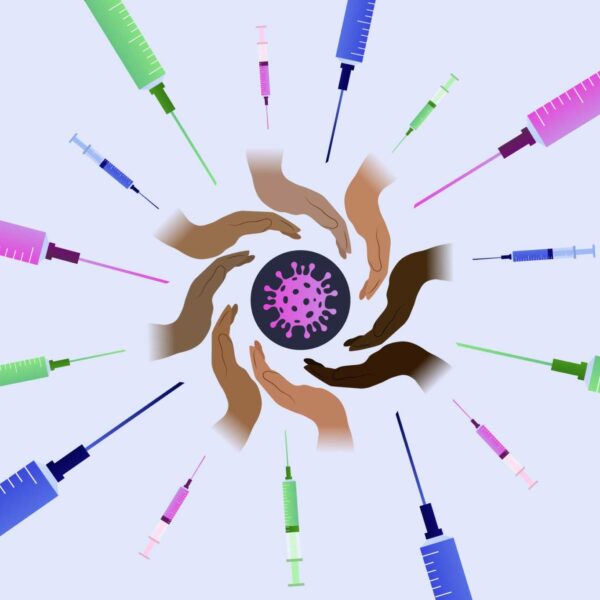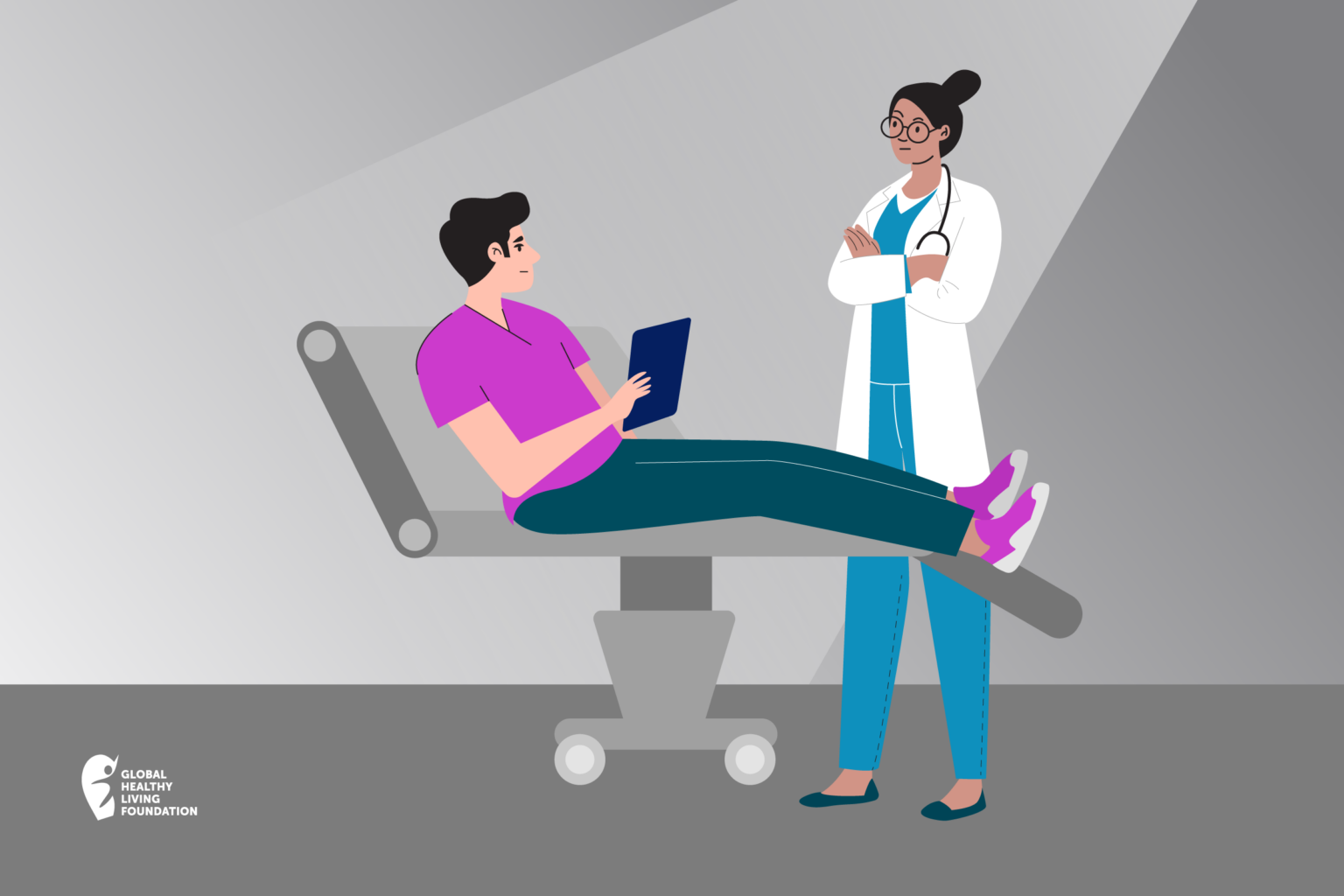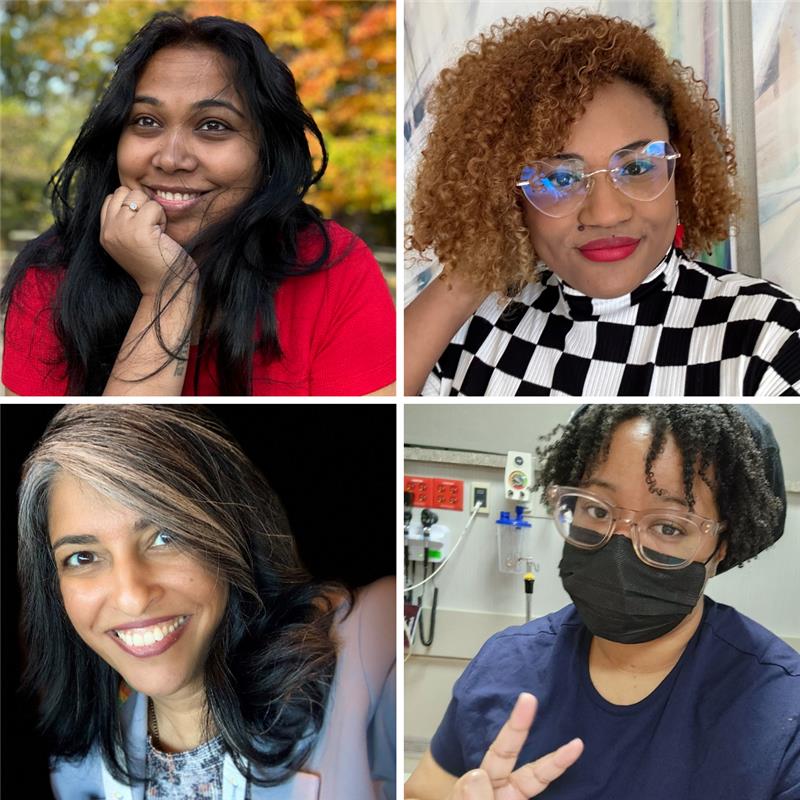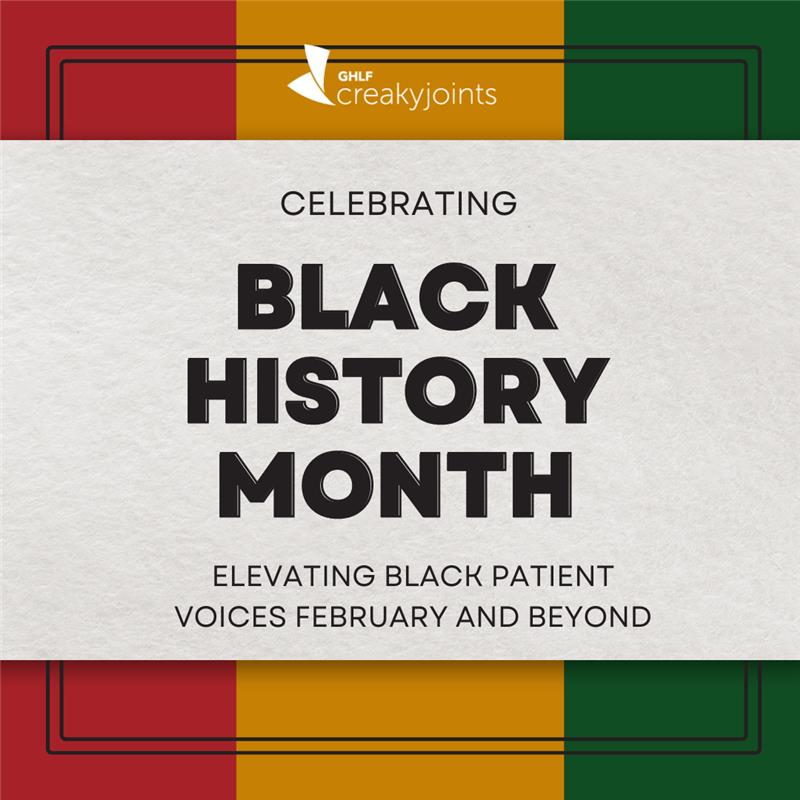50-State Network 2024 Impact
WE’RE NOT ANTI-VAXXERS, WE’RE TRAUMATIZED: HERE’S HOW TO BUILD COVID-19 VACCINE TRUST WITH PEOPLE OF COLOR
WE’RE NOT ANTI-VAXXERS, WE’RE TRAUMATIZED: HERE’S HOW TO BUILD COVID-19 VACCINE TRUST WITH PEOPLE OF COLOR
January 22, 2021
Tinu Abayomi-Paul

Learn more about our FREE COVID-19 Patient Support Program for chronic illness patients and their loved ones.
Now that the U.S. has multiple COVID-19 vaccine options and has been administering them for weeks, public health officials are facing a not very surprising problem: People of color are hesitant about getting it. And so far, the proof is in the pudding: Black people are getting vaccinated at lower rates than white people.
According to an analysis by Kaiser Health News of states that have released their vaccination data by race, “Black Americans are getting COVID vaccinations at dramatically lower rates than white Americans in the first weeks of the chaotic rollout.” In some places, white people are getting vaccinated at two to three times higher the rate of Black people.
In a December poll from the Kaiser Family Foundation, 35 percent of Black adults said they would probably or definitely not get a COVID-19 vaccine. Of course, this is even more concerning because people of color in the U.S. are dying from the coronavirus at nearly three times the rate of white Americans.
So, what’s happening here? Ask a lot of Black people and you’ll get a lot of answers, but here’s my perspective as a Black woman who has been a chronic illness and disability patient advocate for many years.
First, let’s just say this. Generally speaking, Black people are not anti-vaxxers. We may be vaccine hesitant, and the difference matters. In order to improve COVID-19 vaccination in people of color, we must understand the difference between these groups.
The Anti-vaxx Movement Is White Privilege
Over the past decade or so, most of us have become aware to some degree of the anti-vaxxer movement. The term “refers to people who disagree with the use of vaccines for a variety of reasons.”
You can read more here about the movement and how it got started, but it a lot of it has to do with people believing misinformation about vaccine dangers and not wanting infringements on their right to choose whether or not to vaccinate their children.
Social media groups and ill-informed proclamations from celebrities pushed the anti-vaxxer movement into the spotlight. Unfounded fears about vaccines triggering autism fanned the fire, despite virtually every single major trusted public health institution in the U.S. saying and proving that they don’t.
In my opinion, the anti-vaxxer movement is a powerful example of white privilege.
Data has shown that college-educated white women are more likely to be anti-vaxxers. Parents of color aren’t under the misguided notion that they can get away with raising their children however they want. They are aware that this is a great way to bring Child Protective Services into your life and possibly lose custody of your children.
If our kids’ doctors tell us to vaccinate our children, we do it. If our kids’ schools won’t let them attend unless they’re vaccinated, we follow the rules, we don’t fight them.
In contrast, the issue of COVID-19 vaccine hesitancy in people of color is very different.
It’s not about being trendy. It’s not act of anti-socialism. It’s not about cherry-picking which misinformed bloggers, celebrities, or “medical experts” you choose to “believe.”
Vaccine Hesitancy Is a Trust Problem
While there’s no single reason (or, for that matter, solution) for COVID-19 vaccine hesitancy in the Black community, the overarching problem is trust, or rather, a lack of trust.
All the theories about the causes of vaccine hesitancy have one common root: hundreds of years of people of color being unable to trust our government, especially when it comes to health and science.
Old trauma that persists to this day is not easily overcome.
As Karen Attiah wrote in the Washington Post: “Vaccines in vials are no good unless people take them. That requires trust on the part of patients, and therein lies the problem. For many Black Americans, generations of systemic medical racism and predatory experimentation on Black bodies have generated deep distrust of a system that was never built to serve them.”
The very system of vaccine development — which involves stages of clinical trials in which volunteers consent to participate in an experiment with an unknown outcome — is dependent on patients’ trust. And if patients of color were able to trust their doctors, medical institutions, or the government, clear answers from these sources would resolve this vaccine hesitancy problem.
However, disabled people and people of color (in particular Black people), have only to look to their lived experiences and the history of this nation to be supplied with endless reasons not to entrust their well-being to those who have previously abused them.
In ways that are both obvious and subtle, we are still being mistreated by this system that we are supposed to trust — whether we even know it or not.
In discussions about the Black community’s mistrust of the medical system, examples like Henrietta Lacks (a Black woman whose cancer cells were used for decades of medical research without her consent) and the Tuskegee experiments (in which Black men with syphilis were intentionally denied treatment so doctors could study the progression of the disease) come up over and over.
But this is just the tip of the iceberg. Maybe shady and highly unethical experiments are a thing of the past, but current racial disparities in health care are certainly not helping to improve our trust in the system.
To this day, misinformation perpetuates racism in medicine. For an easy recap, check out this episode of Last Week Tonight, which addresses the false claims that Black people have thicker skin, a higher pain tolerance, less sensitive nerve endings, different blood coagulation rates, and more.
And data doesn’t lie. Black babies have more than twice the risk of dying in their first of year of life as white infants, new research shows. Black people are almost three times more likely to die from asthma-related causes than white people, according to the U.S. Department of Health and Human Services Office of Minority Health. A new American Cancer Society report says that Black patients have the highest death rate and shortest survival of any racial/ethnic group in the US for most cancers.
And in a recent — and very relevant — example, a paper in a major medical journal showed that pulse oximeters (a tool that clips on to your fingertip to measure blood oxygen levels) can provide misleading results in Black people. This can lead people to think their blood oxygen levels are higher (read: healthier) than they actually are.
Pulse oximeters were not on my everyday radar before the COVID-19 pandemic, when everyone started Amazon Priming them to their homes to be able to check on their breathing when infected with the coronavirus. And we’re just finding out that they may be less accurate in Black people?
Is the disparity in COVID infections and deaths for Black people supposed to increase our trust?
Is the fact that Black people make up a large proportion of essential workers (and don’t receive hazard pay) supposed to increase our trust?
To Build Trust, Pass the Mic
All of these examples have everything to do with how communities of color think about the COVID-19 vaccine. Racial bias is still a fact of the U.S. health care system — and addressing its many facets is one way to start building back trust.
But this takes time. Years. Decades. So how do you repair the trust between the communities of color and the powers that be in time to get the COVID-19 vaccine distributed now?
To put it simply … You can’t.
However, I’ve been paying attention to Black doctors on Twitter who have been doing their part to come up with ideas and solutions, including panels where Black doctors answer questions and provide trusted information about COVID-19 and the vaccine for these communities.
Check out Cleavon Gilman, MD; Uche Blackstock, MD; or Brittani James, MD to get started.
In early December, Dr. James tweeted a practical proposal for a solution.
“As a Black woman and frontline physician currently caring for patients with and without COVID on Chicago’s South Side, here is what will ACTUALLY work in my view,” tweeted Dr. James, who works at the University of Illinois College of Medicine.
“First, we need to admit that white people and the government have little to no credibility in the average Black person’s eyes. That’s not a debate. That’s a forgone conclusion. What’s more, there is not enough time to correct that perception before this vaccine comes live,” she continued.
“If health systems, the government and providers *really* want Black people to take this vaccine, you all better start passing the mic and passing the power to act to Black and brown people,” she concluded, calling for a solution to empower people of color — from academics to grassroots organizers to church leaders — the platform, resources, and money to address the issue of vaccine hesitancy in communities directly.
Investing in Our Future
The burden simply can’t rest on them, however.
Repairing the medical system by identifying and eliminating racism and disparities is the ultimate goal, and we must act now.
This is not just about getting COVID-19 vaccines in Black arms in 2021. This is about every year that we will have a COVID and flu season in the future. This experience could make us a healthier and more unified nation, but only if we handle it correctly.
Only if we deal with anti-vaxxers with an unrelenting dedication to science, truth, and enforcing penalties as needed.
Only if we see our government and health care system demonstrate that they truly care about the health of every American equally, including every BIPOC, LGBTQ, disabled, or elderly American.
Only if our elected officials demonstrate an earnest dedication to help us bring about quality universal health care for all.
I believe this trust can be regained, but it demands a solid investment in and attention to communities of color. We need to work toward a future that values and uplifts the lived experienced of those most who are most marginalized.
Get Free Coronavirus Support for Chronic Illness Patients
Join the Global Healthy Living Foundation’s free COVID-19 Support Program for chronic illness patients and their families. We will be providing updated information, community support, and other resources tailored specifically to your health and safety. Join now.
Attiah K. The health-care system has failed Black Americans. No wonder many are hesistant about a vaccine. The Washington Post. November 24, 2020. https://www.washingtonpost.com/opinions/2020/11/24/health-care-system-has-failed-black-americans-no-wonder-many-are-hesitant-about-vaccine.
Asthma and African Americans. U.S. Department of Health and Human Services Office of Minority Health. https://minorityhealth.hhs.gov/omh/browse.aspx?lvl=4&lvlid=15.
Bias In Medicine: Last Week Tonight with John Oliver (HBO). YouTube. August 19, 2019. https://www.youtube.com/watch?v=TATSAHJKRd8.
Cancer Facts & Figures for African Americans 2019-2021. American Cancer Society. 2019. https://www.cancer.org/content/dam/cancer-org/research/cancer-facts-and-statistics/cancer-facts-and-figures-for-african-americans/cancer-facts-and-figures-for-african-americans-2019-2021.pdf.
Driscoll A, et al. Effects of Changes in Maternal Age Distribution and Maternal Age-specific Infant Mortality Rates on Infant Mortality Trends: United States, 2000–2017. National Vital Statistics Reports. U.S. Department of Health and Human Services. June 25, 2020. https://www.cdc.gov/nchs/data/nvsr/nvsr69/NVSR-69-05-508.pdf.
‘Henrietta Lacks’: A Donor’s Immortal Legacy. NPR. February 2, 2010. https://www.npr.org/2010/02/02/123232331/henrietta-lacks-a-donors-immortal-legacy.
Kandola A. What is an anti-vaxxer? Medical News Today. November 4, 2020. https://www.medicalnewstoday.com/articles/anti-vaxxer.
Lubrano A. Anti-vaccine parents are often white, college-educated, ‘Whole Foods moms.’ The Philadelphia Inquirer. April 10, 2019. https://www.inquirer.com/news/middle-class-working-class-vaccine-anti-vaxxers-measles-cdc-20190410.html.
Nix E. Tuskegee Experiment: The Infamous Syphilis Study. History. December 15, 2020. https://www.history.com/news/the-infamous-40-year-tuskegee-study.
Recht H, et al. Black Americans Are Getting Vaccinated at Lower Rates Than White Americans. Kaiser Health News. January 17, 2021. https://khn.org/news/article/black-americans-are-getting-vaccinated-at-lower-rates-than-white-americans.
Sjoding MW, et al. Racial Bias in Pulse Oximetry Measurement. The New England Journal of Medicine. December 17, 2020. Doi: https://doi.org/10.1056/NEJMc2029240.
SUBSCRIBE TO GHLF
RELATED POST AND PAGES
_
Was this article helpful?
YesNo



